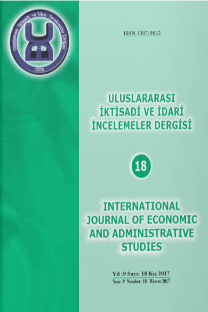AVRUPA’NIN YÜKSELEN EKONOMİLERİNDE BÜTÇE AÇIĞININ ENFLASYON ÜZERİNDEKİ ETKİSİ: PANEL ARDL YAKLAŞIMI
Bütçe açığı, enflasyon, yükselen ekonomiler, panel ARDL
___
- Ahking, F. W. ve Miller, S. M. (1985). The Relationship Between Government Deficits, Money Growth, and Inflation. Journal of Macroeconomics, 7(4), 447-467.
- Alexova, M. (2012). What determines inflation?. International Journal of Monetary Economics and Finance, 5(4), 345-369.
- Ananzeh, I. E. N. (2016). Analyzing the Dynamic Relationship between Budget Deficit, Inflation, and Interest Rate (A Case from Jordan). European Journal of Business and Management, 8(29), 121-130.
- Aslam, A. L. M. ve Lebbe, S. A. (2016). Impact of fiscal deficit on inflation in Sri Lanka: an econo-metric time series analysis. International Letters of Social and Humanistic Sciences, 70, 8-13.
- Breusch, T. S. ve Pagan, A. R. (1980). The Lagrange multiplier test and its applications to model specification in econometrics. The review of economic studies, 47(1), 239-253.
- Bulawayo, M., Chibwe, F. ve Seshamani, V. (2018). The impact of budget deficits on inflation in Zambia. Journal of Economics, 6(2), 13-23.
- Catao, L. A. ve Terrones, M. E. (2005). Fiscal deficits and inflation. Journal of Monetary Econo-mics, 52(3), 529-554.
- Chukwuani, V. N. ve Egiyi, M. A. (2020). Nexus between Budget Deficit and Inflation: Granger-Causality Test Approach. Nexus, 4(10), 19-23.
- Çavuşoğlu, T. (2005). Vergi Gelirleri ve Kamu Harcamaları Açısından Enflasyon: Tanzi ve Ters Tanzi Etkileri. Gazi Üniversitesi İktisadi ve İdari Bilimler Fakültesi Dergisi, 7(3), 35-52.
- Darrat, A. F. (1985). Inflation and Federal Budget Deficits: Some Empirical Results. Public Finance Quarterly, 13(2), 206-215.
- Durguti, E., Kryeziu, N. ve Gashi, E. (2020). How Does the Budget Deficit Affect Inflation Rate–Evidence from Western Balkans Countries. International Journal of Finance & Banking Studies, 9(1), 1-10.
- Guess, G. ve Koford, K. (1984). Inflation, recession and the federal budget deficit (or, blaming eco-nomic problems on a statistical mirage). Policy Sciences, 17(4), 385-402.
- Habibullah, M. S., Cheah, C. ve Baharom, A. H. (2011). Budget deficits and inflation in thirteen As-ian developing countries. International Journal of Business and Social Science, 2(9), 192-204.
- Helmy, O. A. (2008). The impact of budget deficit on inflation in Egypt. Egyptian Center for Econo-mic Studies.
- Hondroyiannis, G. ve Papapetrou, E. (1997). Are budget deficits inflationary? A cointegration app-roach. Applied Economics Letters, 4(8), 493-496.
- Ishaq, T. ve Mohsin, H. M. (2015). Deficits and inflation; Are monetary and financial institutions worthy to consider or not?. Borsa Istanbul Review, 15(3), 180-191.
- Jalil, A., Tariq, R. ve Bibi, N. (2014). Fiscal deficit and inflation: New evidences from Pakistan using a bounds testing approach. Economic Modelling, 37, 120-126.
- Kamba-Kibatshi, M. (2019). Analysis of the Impact of the Budget Deficit on Inflation in the Demo-cratic Republic of Congo as one of the Developping Countries. International Journal of Scientific Research and Engineering Development, 2(1), 93-117.
- Karras, G. (1994). Macroeconomic Effects of Budget Deficits: Further İnternational Eviden-ce. Journal of International Money and Finance, 13(2), 190-210.
- Komulainen, T. ve Pirttila, J. (2002). Fiscal explanations for inflation: Any evidence from transition economies?. Economics of Planning, 35(3), 293-316.
- Lin, H. Y. ve Chu, H. P. (2013). Are fiscal deficits inflationary?. Journal of International Money and Finance, 32, 214-233.
- Murshed, M., Amin, S. ve Chadni, M. H. (2018). Causality analysis between inflation, budget deficit and money supply: Empirical evidence from Bangladesh. World Journal of Social Scien-ces, 8(3), 94-109.
- Myovella, G. A. ve Kisava, Z. S. (2018). Budget deficit and inflation in Tanzania: ARDL bound test approach. Journal of Business, Economics and Finance, 7(1), 83-88.
- Nwakoby, C., Okaro, C. S. O. ve Ananwude, A. (2016). Fiscal deficit and inflation in an oil rich exporting country: Evidence from Nigeria. Journal of Policy and Development Stu-dies, 10(3), 140-155.
- Oseni, I. O. ve Sanni, H. Y. (2016). Does Fiscal Deficit Granger Cause Impulsiveness in Inflation Rate in Nigeria?. Acta Universitatis Danubius. Œconomica, 12(4), 208-216.
- Patinkin, D. (1993). Israel's stabilization program of 1985, or some simple truths of monetary the-ory. The Journal of Economic Perspectives, 7(2), 103-128.
- Pesaran, H. M. (2004). General diagnostic tests for cross-sectional dependence in pa-nels. University of Cambridge, Cambridge Working Papers in Economics, 435.
- Pesaran, M. H. (2007). A simple panel unit root test in the presence of cross‐section dependen-ce. Journal of applied econometrics, 22(2), 265-312.
- Sill, K. (2005). Do budget deficits cause inflation?. Business Review, 2005(Q3)
- Ssebulime, K. ve Edward, B. (2019). Budget deficit and inflation nexus in Uganda 1980–2016: a co-integration and error correction modeling approach. Journal of Economic Structu-res, 8(1), 1-14.
- Vieira, C. (2000). Are fiscal deficits inflationary? Evidence for the EU. Economic Research Paper, 7, 1-16.
- Win, T. (2017). Fiscal deficit and its impact on inflation, causality and co-integration (Doctoral dis-sertation, KDI School).
- Woodford, M. (1994). Monetary policy and price level determinacy in a cash-in-advance eco-nomy. Economic theory, 4(3), 345-380.
- ISSN: 1307-9832
- Yayın Aralığı: 4
- Başlangıç: 2008
- Yayıncı: Kenan ÇELİK
UZLAŞMANIN ETKİNLİĞİNİN ARTTIRILMASINDA MÜKELLEF KREDİ DERECELENDİRME KARNESİ KULLANIMI
BÜTÜNLEŞİK BİR ÇKKV MODELİ İLE SİGORTA ŞİRKETLERİNİN PİYASA PERFORMANSININ ANALİZİ
ELEKTRONİK ÖDEMELERİN ENFLASYON DİNAMİKLERİ ÜZERİNDEKİ ROLÜ
KİLİT DENETİM KONULARINA ETKİ EDEN FAKTÖRLER: BIST KOBİ ÖRNEĞİ
İdris VARICI, Fevziye KALIPÇI ÇAĞIRAN
TÜRKİYE’DE KIRSAL KALKINMA VE GÖÇ İLİŞKİSİ: BİR PANEL VERİ ANALİZİ
AVRUPA’NIN YÜKSELEN EKONOMİLERİNDE BÜTÇE AÇIĞININ ENFLASYON ÜZERİNDEKİ ETKİSİ: PANEL ARDL YAKLAŞIMI
Bahadır SAZAK DOĞAN, Tuğay GÜNEL
NET HATA VE NOKSAN HESABI BELİRLEYİCİLERİNİN ANALİZİ: TÜRKİYE ÖRNEĞİ
Doğan KEŞAP, ALİ RIZA SANDALCILAR
İÇ KONTROL SİSTEMİNİN ŞİRKETLERİN FİNANSAL PERFORMANSINA ETKİSİ: BIST ŞİRKETLERİNDE BİR UYGULAMA
